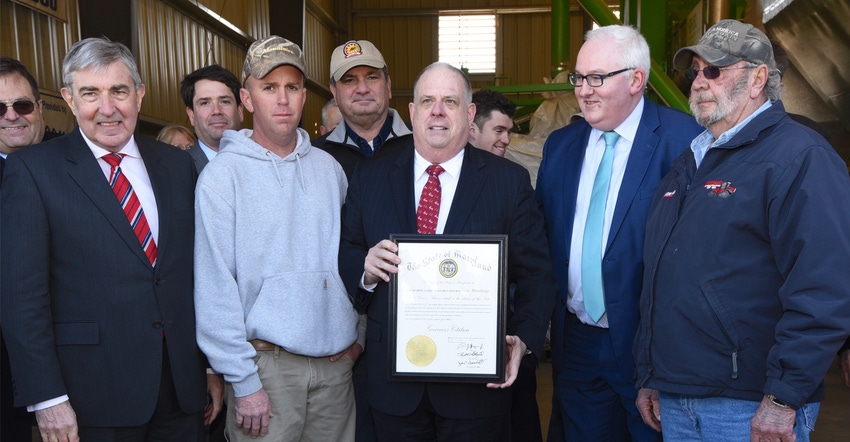
Maryland’s first fluidized bed combustion system is up and running at Double Trouble Farms near Rhodesdale. Last week, Gov. Larry Hogan, Ag Secretary Joe Bartenfelder, state legislative leaders and a flock of DelMarva poultry and environmental leaders toured the Eastern Shore facility to see what they were getting for their $1.11 million waste technology grant.
Maryland Department of Agriculture awarded a $970,000 animal waste technology grant to Ireland-based Biomass Heating Solutions Inc. for the manure-to-energy project, plus another $139,000 to monitor its operation for one year. In brief, the pilot project burns poultry litter to provide hot-water heating to two of four broiler houses, plus electricity for the farm. A highly marketable dry phosphorus- and potash-containing ash is the only other byproduct of this closed-loop system.
The project is at the center of the DelMarva poultry industry, which is striving to find new, profitable solutions for an oversupply of poultry manure fertilizer. Celebrating the event, Hogan said: "I commend [Bob Murphy and his sons] and the entire Double Trouble Farms team for leading the way for farmers to improve water quality, increase energy independence and improve animal waste management to ensure the sustainability of animal agriculture in our state."
Bartenfelder added: “A great deal of credit goes to the Murphy family for taking the time and risk involved in being the test case for a promising new way of doing business. Biomass Heating Solutions Inc., with the support of Mountaire, has adapted innovative manure management technology to benefit the poultry industry and the Murphy family's farm.”
The project has the following benefits that University of Maryland researchers expect to confirm:
• Reduced environmental impact. A reduction in the potential environmental impact of manure resources
• Lower energy costs. A reduction in energy costs through using heat from the manure as a source for heating poultry houses
• Improved animal welfare. Improved animal welfare, with improved health and reduced risk of diseases via dry facility heating
• Improved performance. Faster growth, with poultry reaching target weight more quickly
• Additional revenue. Potential expansion of revenue streams, with earnings from the sale of excess electricity and a fertilizer byproduct
New use, but not new technology
Fluidized bed furnace technology is already used by the utility industry for burning high-sulfur coal. BHSL’s system is also being used on Cargill poultry farms in the United Kingdom.
In 2015, Cargill’s European poultry business signed a 20-year agreement with the Limerick-based agri-tech company. One manure-to-energy system and heating network was for 13 poultry houses.
About the Author(s)
You May Also Like




